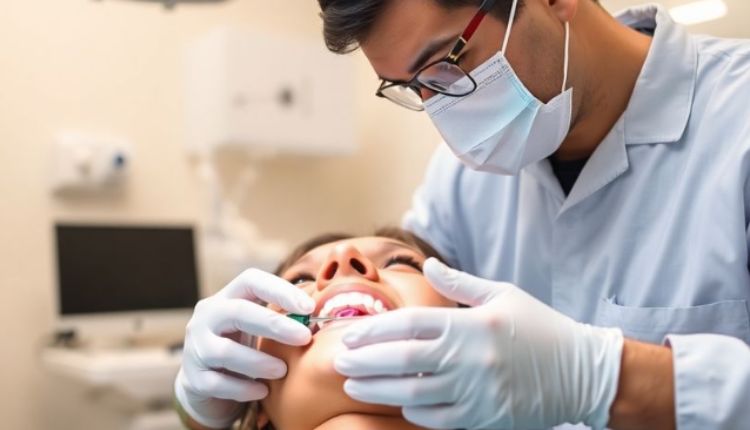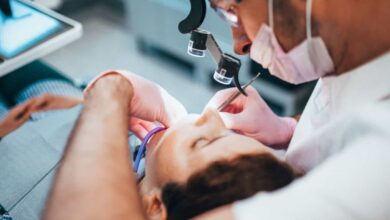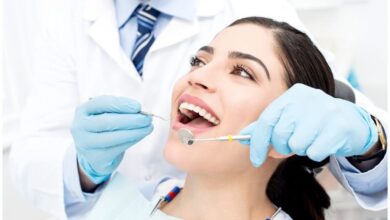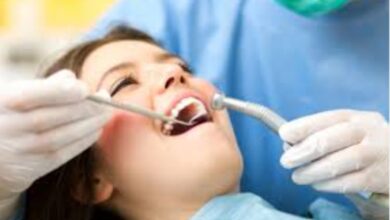Finding the Best Emergency Dentist in San Francisco: Your Guide to Urgent Dental Care

Dental emergencies can happen at any time, often when you least expect them. Whether it’s a sudden toothache or a broken tooth, knowing what to do and where to go is crucial. In San Francisco, finding the right emergency dentist can make a big difference in your comfort and recovery. This guide will help you understand what to look for in an emergency dentist in San Francisco, common dental emergencies, and how to handle them.
- Understanding Emergency Dental Services
- Finding an Emergency Dentist in San Francisco
- Common Dental Emergencies
- Emergency Dental Tips and Prevention
- What to Expect During an Emergency Dental Visit
- Benefits of Having an Emergency Dentist
- Cost Considerations for Emergency Dental Care
- Wrapping It Up: Your Emergency Dental Care Plan
- Frequently Asked Questions
Key Takeaways
- Know what counts as a dental emergency to seek timely help.
- Research local emergency dentists to find one that meets your needs.
- Read reviews from other patients to gauge the quality of care.
- Practice good oral hygiene to prevent emergencies from happening.
- Understand the costs involved in emergency dental care, including insurance options.
Understanding Emergency Dental Services
What Constitutes a Dental Emergency?
So, what exactly counts as a dental emergency? It’s more than just a minor toothache. A true dental emergency involves situations that need immediate attention to alleviate severe pain, stop ongoing bleeding, or save a tooth. Think of it this way: if you’re debating whether to wait it out or seek help right away, it’s probably leaning towards emergency territory.
- Uncontrolled bleeding in the mouth.
- Severe pain that can’t be managed with over-the-counter medication.
- A knocked-out tooth.
It’s easy to underestimate dental problems, but ignoring them can lead to bigger issues down the road. Don’t hesitate to seek help if you’re unsure. It’s always better to be safe than sorry when it comes to your oral health.
Types of Emergency Dental Services
Emergency dentists offer gentle treatment for a range of problems. Here’s a quick rundown of some common services:
- Pain Management: Addressing severe toothaches or infections with medication or procedures.
- Tooth Repair: Fixing chipped, cracked, or broken teeth to prevent further damage.
- Re-implantation: Attempting to re-insert a knocked-out tooth back into its socket.
- Abscess Treatment: Draining and treating dental abscesses to prevent the spread of infection.
- Lost Filling or Crown Replacement: Replacing lost fillings or crowns to protect the underlying tooth structure.
How Emergency Dentists Operate
Emergency dental clinics are set up to handle urgent cases quickly and efficiently. They usually have extended hours or on-call dentists to provide care outside of regular business hours. When you arrive, expect a quick assessment to determine the severity of your issue. The dentist will then focus on relieving your pain and addressing the immediate problem. They’ll also discuss treatment options and create a plan to prevent future emergencies. It’s all about getting you out of pain and back on track as soon as possible.
Finding an Emergency Dentist in San Francisco
Finding a reliable emergency dentist in San Francisco when you’re dealing with a painful or urgent dental issue is super important. You don’t want to be stuck searching endlessly when you’re already in discomfort. Here’s how to make the process smoother:
Researching Local Options
Start by looking online. Google Maps is your friend! Search for “emergency dentist San Francisco” and see what pops up. Check out dental directories too; many list dentists who offer emergency dental care. Don’t just pick the first one you see, though. Make a list of a few potential candidates. Consider location – you want someone relatively close by, especially if you’re in pain. Also, check their hours. Some emergency dentists are only available during certain times, or offer 24/7 services.
Evaluating Dentist Credentials
Once you have a list, dig a little deeper. Make sure the dentists are licensed and in good standing with the California Dental Board. You can usually find this information on the dentist’s website or by searching the dental board’s online database. Look for dentists with experience in handling emergency cases. Do they have any specialized training or certifications? It’s also a good idea to see if they’re affiliated with any local hospitals or dental schools. This can be a sign of their commitment to professional development and high-quality care.
Reading Patient Reviews
Patient reviews can give you a real sense of what to expect. Check out sites like Yelp, Google Reviews, and Healthgrades. Look for patterns in the reviews. Are people consistently praising the dentist’s bedside manner, or complaining about long wait times? Pay attention to how the dentist responds to negative reviews – does it seem like they’re genuinely trying to address concerns? Keep in mind that every practice gets a bad review now and then, but a consistent stream of negative feedback should be a red flag.
It’s worth noting that some dental offices specialize in certain areas. For example, Yerba Buena Dentistry is committed to providing timely emergency dental care. If you have a specific type of emergency, like a broken tooth or severe infection, you might want to look for a dentist with expertise in that area. Don’t be afraid to call the office and ask questions before you commit to an appointment.
Common Dental Emergencies
It’s good to know what constitutes a real dental emergency. Not everything that feels a little off requires a mad dash to the dentist, but some situations definitely do. Knowing the difference can save you pain, time, and money. Let’s break down some common scenarios.
Toothaches and Pain Management
Toothaches are a pretty common complaint, but a severe, persistent toothache? That’s a different story. It could signal a serious infection or a deep cavity that needs immediate attention. Here’s what to consider:
- Intensity: Is it a dull ache, or a throbbing pain that keeps you up at night?
- Duration: Has it been lingering for days, or did it just pop up?
- Accompanying Symptoms: Are there other symptoms like fever, swelling, or sensitivity to hot or cold?
If you’re dealing with intense pain, especially with other symptoms, it’s time to call an emergency dentist. Over-the-counter pain relievers can help temporarily, but they won’t solve the underlying problem. You might need dental pain relief right away.
Chipped or Broken Teeth
Chipping a tooth while biting into something hard or breaking it during an accident is definitely alarming. What you do next is important. Here’s a quick guide:
- Rinse your mouth: Use warm water to clean the area.
- Save any pieces: If possible, keep any broken pieces of the tooth.
- Apply pressure: If there’s bleeding, apply pressure with a clean gauze pad.
A chipped tooth might not always seem like an emergency, but even small chips can expose the inner layers of the tooth, leading to sensitivity and potential infection. A severely broken tooth definitely needs immediate care to prevent further damage and alleviate pain.
Lost Fillings and Crowns
Losing a filling or a crown can be more than just inconvenient; it can leave your tooth vulnerable. Here’s what to do:
- Keep the crown (if possible): If you still have the crown, clean it gently.
- Over-the-counter pain relief: Use as needed for sensitivity.
- Temporary Fix: You can buy dental cement at the drugstore to temporarily reattach the crown, but see a dentist ASAP.
Leaving a tooth exposed can lead to sensitivity, discomfort, and even further damage. Plus, it can affect your bite and how you chew. Getting a crown replaced quickly is important for your oral health.
Emergency Dental Tips and Prevention
Even with access to the best urgent oral care, preventing dental emergencies is always the better option. It saves you pain, time, and money. Here’s how to keep your smile safe and sound.
Home Remedies for Temporary Relief
Sometimes, you can’t get to a dentist right away. In those situations, home remedies can offer temporary comfort. But remember, these are just stop-gap measures until you can see a professional. They are not a substitute for proper dental treatment.
- Over-the-counter pain relievers: Medications like ibuprofen or acetaminophen can help manage pain and reduce inflammation.
- Cold compress: Applying a cold pack to your cheek can minimize swelling.
- Saltwater rinse: Gently rinsing your mouth with warm saltwater can help clean the area and ease discomfort.
It’s important to remember that home remedies are not a long-term solution. If you’re experiencing a dental emergency, it’s crucial to seek professional help as soon as possible.
Regular Check-Ups and Preventive Care
The best way to avoid dental emergencies is through regular check-ups and preventive care. Think of it like servicing your car – regular maintenance prevents bigger problems down the road.
- Professional cleanings: Remove plaque and tartar buildup that can lead to cavities and gum disease.
- Dental exams: Allow your dentist to spot potential problems early on.
- Fluoride treatments: Strengthen tooth enamel and protect against decay.
Avoiding Dental Emergencies
Being mindful of your habits can significantly reduce your risk of dental emergencies. It’s all about making smart choices and protecting your teeth from harm.
- Wear a mouthguard: If you play sports, a mouthguard is a must. It’s a simple way to protect your teeth from impact.
- Avoid hard and sticky foods: These can chip or break your teeth, or dislodge fillings.
- Don’t use your teeth as tools: Opening packages or bottles with your teeth is a recipe for disaster.
What to Expect During an Emergency Dental Visit
So, you’ve got a dental emergency and you’re heading to the dentist. What happens next? It’s natural to feel a little anxious, but knowing what to expect can really help ease your nerves. Here’s a breakdown of what usually goes down during an emergency dental visit.
Initial Consultation and Diagnosis
First things first, the dentist will want to figure out what’s going on. This usually starts with a quick chat about your symptoms and medical history. They’ll ask about the pain, when it started, and anything that might have caused the problem. Then comes the examination. The dentist will take a close look at your teeth, gums, and mouth. X-rays are pretty common too, as they help the dentist see what’s happening beneath the surface – things like infections, bone damage, or impacted teeth. This initial assessment is super important because it helps the dentist make an accurate diagnosis and figure out the best way to treat you. If you are experiencing a dental emergency, it’s important to seek immediate care.
Treatment Options Available
Once the dentist knows what’s up, they’ll explain your treatment options. This could be anything from a simple filling to root canal therapy or even an extraction. The dentist will walk you through the pros and cons of each option, so you can make an informed decision about your care. They’ll also consider things like your budget and preferences. Here are some common treatments:
- Pain medication.
- Antibiotics (if there’s an infection).
- Fillings or crowns.
- Root canal.
It’s important to ask questions and voice any concerns you have. The dentist is there to help you, and they want you to feel comfortable with the treatment plan.
Post-Treatment Care and Follow-Up
After the treatment, the dentist will give you instructions on how to care for your mouth at home. This might include things like:
- Taking pain medication as prescribed.
- Using a special mouthwash.
- Avoiding certain foods.
- Brushing and flossing gently.
They’ll also schedule a follow-up appointment to check on your progress and make sure everything is healing properly. Don’t skip the follow-up! It’s a crucial part of ensuring your long-term dental health.
Benefits of Having an Emergency Dentist
Immediate Access to Care
Let’s be real, dental emergencies never happen at a convenient time. That’s why knowing you have access to an emergency dentist is a huge relief. Instead of waiting days (or even weeks!) for an appointment, you can get seen quickly. This is especially important when you’re dealing with severe pain or a potentially serious issue. Think about it: a sudden toothache on a Friday night? A knocked-out tooth during a weekend sports game? Having a dentist you can call in these situations makes all the difference. It’s about peace of mind, knowing help is available when you need it most. You can get urgent dental care fast.
Expertise in Urgent Situations
Regular dentists are great for check-ups and routine work, but emergency dentists have specific training and experience in handling urgent dental problems. They’re equipped to deal with everything from infections and abscesses to broken teeth and trauma. This specialized knowledge means they can quickly assess the situation, diagnose the problem, and start treatment right away. It’s not just about fixing the immediate issue; it’s about preventing further damage and complications. They can:
- Stop the bleeding.
- Relieve severe pain.
- Prevent infections from spreading.
- Save a damaged or knocked-out tooth.
Having an emergency dentist is like having a specialized doctor on call for your teeth. They know how to handle the pressure and make quick decisions in stressful situations.
Comprehensive Treatment Plans
An emergency dentist doesn’t just patch you up and send you on your way. They’ll also develop a treatment plan to address the underlying cause of the emergency and prevent it from happening again. This might involve follow-up appointments, restorative work, or even referrals to specialists. The goal is to get your oral health back on track and ensure long-term stability. They will also help you maintain a healthy mouth.
Cost Considerations for Emergency Dental Care
Insurance Coverage for Emergency Services
Navigating the costs of emergency dental care can feel overwhelming, especially when you’re already dealing with pain or anxiety. The good news is that many dental insurance plans do offer some level of coverage for emergency services. However, the extent of that coverage can vary widely depending on your specific plan. It’s a good idea to check your policy details or contact your insurance provider directly to understand what’s covered. Some plans may cover a percentage of the cost, while others might have a fixed amount they’ll pay. Keep in mind that deductibles and co-pays will likely apply.
Payment Plans and Financing Options
Not everyone has dental insurance, and even those who do might find that their coverage doesn’t fully cover the cost of emergency treatment. If you’re facing a large bill, don’t panic! Many dental offices offer payment plans or financing options to help make the cost more manageable. These plans allow you to spread out the payments over a period of time, making it easier to fit the expense into your budget. Some offices may also offer discounts for paying in cash or using certain payment methods. It’s always worth asking about available options to find a solution that works for you. Don’t hesitate to ask about financing options before treatment begins.
Understanding Out-of-Pocket Costs
Even with insurance or a payment plan, you’ll likely have some out-of-pocket costs to consider. These can include deductibles, co-pays, and any portion of the treatment that isn’t covered by your insurance. It’s important to have a clear understanding of these costs upfront so you can plan accordingly. Ask your dentist for a detailed estimate of the total cost of treatment, including any potential additional expenses. Also, be aware that the cost of emergency dental care can vary depending on the type of treatment you need and the location of the dental office. For example, a simple extraction might cost less than a root canal. Here are some potential out-of-pocket costs:
- Consultation fees
- X-rays
- Medications
- Follow-up appointments
It’s important to remember that delaying treatment due to cost concerns can sometimes lead to more serious and expensive problems down the road. Addressing dental emergencies promptly can often save you money in the long run by preventing complications and the need for more extensive procedures.
Wrapping It Up: Your Emergency Dental Care Plan
So, there you have it. Finding the right emergency dentist in San Francisco doesn’t have to be a headache. Just remember to keep a list of local dentists handy, know what to do in a pinch, and don’t hesitate to reach out when you need help. Whether it’s a toothache, a broken tooth, or something else, having a go-to dentist can make all the difference. And hey, don’t forget to take care of your teeth to avoid those emergencies in the first place! Regular check-ups and being mindful of what you eat can save you a lot of trouble down the road. Stay prepared, and keep smiling!
Frequently Asked Questions
What should I do if I have a toothache?
If you have a toothache, try rinsing your mouth with warm salt water. Over-the-counter pain relievers can help until you see a dentist.
How can I know if I need emergency dental care?
You should seek emergency dental care if you have severe pain, a knocked-out tooth, or a broken tooth that causes bleeding.
What types of services do emergency dentists provide?
Emergency dentists can help with toothaches, broken teeth, lost fillings, and other urgent dental issues.
How can I find an emergency dentist in San Francisco?
You can search online for emergency dentists in San Francisco, check reviews, and ask for recommendations from friends or family.
What should I expect during an emergency dental visit?
During your visit, the dentist will examine your teeth, diagnose the issue, and discuss treatment options to relieve your pain.
Are emergency dental services expensive?
Costs can vary, but many dental insurance plans cover emergency services. It’s best to check with your provider for details.




